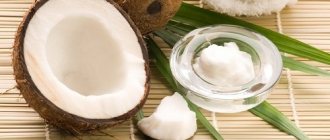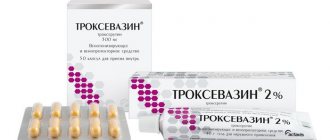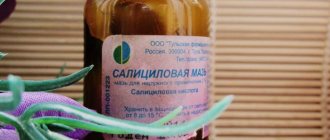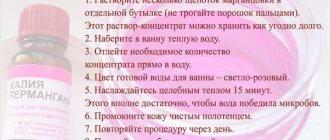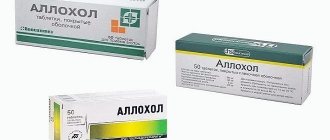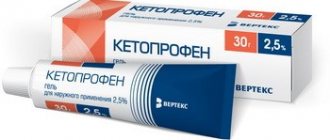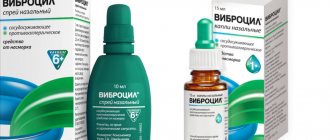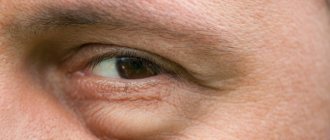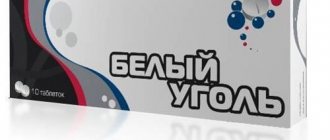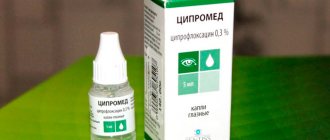Heparin is often used in the treatment of veins and blood vessels. Will heparin ointment be useful for hemorrhoids?
Hemorrhoidal disease is a very common disease in the modern world. People lead a sedentary lifestyle, drink alcohol, and suffer from constipation. At this moment, the veins located in the rectum expand. Inflammation occurs and discomfort appears. In some cases, complications and the need for urgent surgery are possible.
At the first symptoms of proctological diseases, doctors prescribe various medications and procedures. Often, in the treatment of hemorrhoids, local drugs with rapid action are used. One such remedy is heparin ointment.
| Features of the ointment | |
| Can it be used for hemorrhoids? | Yes! This is an excellent analgesic and antithrombotic drug for external use. |
| What does it help with? | Effective for thrombosis of hemorrhoidal veins, thrombophlebitis of superficial veins, hematomas, lumps after injections. |
| Is it allowed during pregnancy and lactation? | Not recommended! Use is justified only in situations where the effect of treatment for the mother outweighs the possible risk to the fetus or child. |
| What treatment is effective | Apply ointment to the affected area 3 times a day (1 g per 5 cm area) and gently rub in. |
| Cost of the drug | Price 40-60 rubles |
Composition of the drug and description of components
Heparin ointment is a homogeneous gel-like mass of white-yellow color, packaged in aluminum tubes of 10 and 25 grams.
This drug is a combination drug, since it contains three active ingredients, namely: heparin, anesthesin and benzene ester of nicotinic acid.
Most of all heparin ointment contains heparin, which belongs to direct anticoagulants. Under the influence of this substance, already formed blood clots are dissolved and the formation of new ones is prevented by reducing the level of fibrin in the blood.
Anesthesin or benzocaine is a local anesthetic that disrupts the transmission of signals from pain receptors to the cerebral cortex.
Nicotinic acid benzyl ester dilates blood vessels, which will facilitate the rapid penetration of other components of the heparin ointment into the tissue.
The auxiliary composition of the drug is represented by glycerin, purified water, petroleum jelly, stearin D, vegetable oil and other substances that maintain the shape of the drug, facilitate the absorption of the main ingredients and soften the skin.
Characteristics of the medicine
| Description of the product | Special instructions for use | Analogs and price |
| The drug is a thick, homogeneous consistency of white (or slightly yellowish) color, has a faint, pleasant aroma, and does not contain foreign impurities or inclusions. The product is produced in special tubes with a capacity of 10 or 25 grams. (the drug is designed for long-term use, so the patient can choose the most convenient format for himself in terms of volume). The product is used for local external application. | It is important to strictly follow the dosage and duration of use (this information is indicated in the instructions for the product). Otherwise, unpleasant side effects may develop:
It is important to remember that using the drug together with topical NSAIDs is fraught with the development of local bleeding and worsening the course of the disease. | The average cost of the product varies between 50-100 rubles. (depending on volume). If there are contraindications, Heparin ointment can be replaced with the following analogues:
|
https://youtu.be/PrUvPpF5K6E
Pharmacological properties of heparin ointment
The therapeutic effect of the drug is achieved through the combined action of its components, due to which it has the following pharmacological properties:
- anticoagulant;
- painkiller;
- anti-inflammatory;
- healing.
Let us consider in more detail the pharmacological properties of the drug.
Anticoagulant effect
The anticoagulant effect of heparin ointment is due to heparin, which blocks the production of fibrin. Since fibrin is the basis for the formation of blood clots, the risk of thrombosis of hemorrhoids is significantly reduced, and further compaction and enlargement of already formed blood clots is stopped.
In addition, heparin, by thinning the blood, improves microcirculation, which in turn will accelerate the recovery of affected anal tissue.
Analgesic effect
The analgesic effect of the drug is due to anesthesin, which is more often called benzocaine. As we have already said, this substance blocks the transmission of nerve impulses from receptors located in the anus to the cerebral cortex. Therefore, if you smear hemorrhoids with heparin ointment, you can instantly relieve pain and itching, which is very important, because painful sensations not only bring a lot of suffering to patients, but also disrupt their quality of life.
Anti-inflammatory effect
Almost all symptoms of hemorrhoids are caused by inflammation of the hemorrhoids and anal tissue. When applying the ointment to the affected area, the severity of the inflammatory process in the tissues of the anus decreases due to increased blood circulation. Thus, heparin ointment not only resolves blood clots, but also relieves pain, swelling, irritation and other manifestations of inflammation in hemorrhoids.
Healing effect
The healing effect of heparin ointment also belongs to heparin, which accelerates microcirculation and improves nutrition of anal tissue, which has a positive effect on regeneration processes.
Thanks to its successfully selected composition, heparin ointment helps to quickly cope with pain, itching and burning in the anus, as well as such a dangerous complication as anorectal thrombosis.
Complications after surgery
Quite often after surgery complications such as:
- narrowing of the anus;
- pain syndrome;
- bleeding;
- the appearance of a fistula;
- suppuration.
It often happens that after surgery a patient is afraid of pain, and this forces him to restrain himself, postponing going to the toilet. Subsequently, constipation may reappear. In the postoperative period, feces can damage wounds that have not yet completely healed. Therefore, on the first day, it is advisable to completely give up food and fast so that the urge to go to the toilet does not occur. In the following days, it is important to adhere to proper nutrition, which eliminates the occurrence of diarrhea, constipation and flatulence, and bowel movements are more gentle. Also, for complications of hemorrhoids, various anti-inflammatory drugs, for example, ointments, suppositories and gels, which relieve inflammation, reduce pain and help soften stool, help well. It is good to use cool baths when blood and pain appear in the postoperative period. Cold water constricts blood vessels and thereby stops bleeding. Instead of a bath, you can use a shower by directing a cool stream of water to the anal area. After the procedure, you can use pain-relieving suppositories or ointments.
https://youtu.be/6Pc7PsYvonA
When should heparin ointment be used for hemorrhoids?
According to the official instructions, heparin ointment can be used in proctology for the following diseases:
- internal hemorrhoids;
- external hemorrhoids;
- anorectal thrombosis;
- prevention of thrombosis of hemorrhoids;
- postpartum acute hemorrhoids;
- anal tears without signs of bleeding.
Contraindications for use
Before using the drug, you should consult your doctor to rule out any contraindications. Although heparin ointment has virtually no negative effects, treat the treatment with caution, since heparin reduces clotting, which can cause bleeding.
It is not recommended to use the cream for the following pathologies:
- formation of skin ulcers;
- cirrhosis of the liver;
- deep fissures in the anus;
- constipation;
- necrosis;
- rectal bleeding;
- stomach ulcer;
- hypertension.
Individual intolerance to the active components of the drug is also possible, resulting in an allergic reaction.
How to use heparin ointment for hemorrhoids?
Hemorrhoids can be treated with heparin ointment only after consultation with a specialist - a proctologist. Only the attending physician will be able to determine the presence of contraindications to the use of the drug and minimize the risk of adverse reactions.
Also, before applying heparin ointment, it is necessary to prepare the anorectal area, since the quality of preparation may affect the effectiveness of the drug. To do this you need to do the following:
- empty your bowels;
- wash the skin of the anus and genitals with warm water and baby soap;
- dry the skin with a soft towel.
This medication can only be used externally or rectally. How to apply heparin ointment depends on the location of the hemorrhoids.
Use for external hemorrhoids
For external hemorrhoids, the medicine should be applied in a thin layer to the external hemorrhoidal node from the outside, then rub the medicine into the skin with massaging movements. Hemorrhoids should be smeared with heparin ointment 2-3 times a day for 5-7 days.
External hemorrhoids can also be treated with a compress with heparin ointment. To do this, squeeze a little product onto a piece of gauze or a cotton pad and apply it to the anus for one hour.
Use for internal hemorrhoids
For internal hemorrhoids, heparin ointment is injected into the rectal canal using a cotton pad, which is soaked with this agent. It is better to carry out the procedure before going to bed, and in the morning the tampons will come out naturally during bowel movements. The duration of internal hemorrhoids, like external hemorrhoids, is 5-7 days.
Manufacturers warn that after applying heparin ointment, discomfort or burning in the anus may occur, which will go away on its own within 10-15 minutes. This reaction to the drug is considered normal.
For male potency
The drug is able to restore natural male potency in a safe way, unlike advertised stimulants. At the same time, you can save a lot of money, because the cost of the ointment is several times cheaper than Viagra.
The mechanism of action is based on restoring blood circulation in the vessels of the groin area. This is especially true in cases where potency decreases due to atherosclerosis or vasoconstriction.
Regular use of the product also helps to cleanse their walls of stagnation.
Algorithm for using the composition:
- the groin area is subject to treatment;
- frequency of ointment application – 2 rubles. in a day;
- for premature ejaculation, the product is applied to the head of the genital organ;
- The duration of the course should not exceed 14 days.
Are side effects possible when treating hemorrhoids with heparin ointment?
Side effects of the drug are extremely rare. Most often, patients experience local allergic reactions to the components of the ointment, including itching, swelling, redness and urticaria in the anus.
If you experience an allergy to the drug, you must immediately stop using it, take any antiallergic medication and contact your doctor to adjust the treatment.
To avoid allergies, before treating hemorrhoids with heparin ointment, you can conduct a sensitivity test. The essence of this test is to apply a drop of ointment to the skin of the inner surface of the forearm and wait 20 minutes. If during this time you experience itching, burning, urticaria or hyperemia, you should absolutely not use the product.
Analogs
If for some reason it is not possible to use heparin-based ointment, you can choose a suitable substitute taking into account the nature of the disease or injury.
Among the well-known analogues:
- Venitan (242 rubles);
- Dolobene (450 rub.);
- Hepatrombin (220 rub.);
- Trombless Plus (240 rub.).
If you have questions regarding the selection of medication, you should consult your doctor. The specialist will adjust the treatment process, which will ensure the expected therapeutic result.
Is it possible to treat hemorrhoids during pregnancy with heparin ointment?
For half of expectant mothers, the period of waiting for a child is denigrated by hemorrhoids. This is facilitated by limited physical activity, frequent constipation, increased levels of progesterone, compression of the vessels of the rectum by the pregnant uterus and increased pressure within the abdominal cavity. Most often, the disease manifests itself in the second or third trimesters.
When selecting drugs for the treatment of hemorrhoids in expectant mothers, specialists face problems, since most antihemorrhoidal drugs are contraindicated in this period. The most important criterion for choosing treatment tactics is harmlessness to the fetus.
Heparin ointment is successfully used in the treatment of hemorrhoids in pregnant women, since its components are safe for the unborn baby. But even taking into account the safety, the use of this drug is possible only as prescribed by the attending physician.
